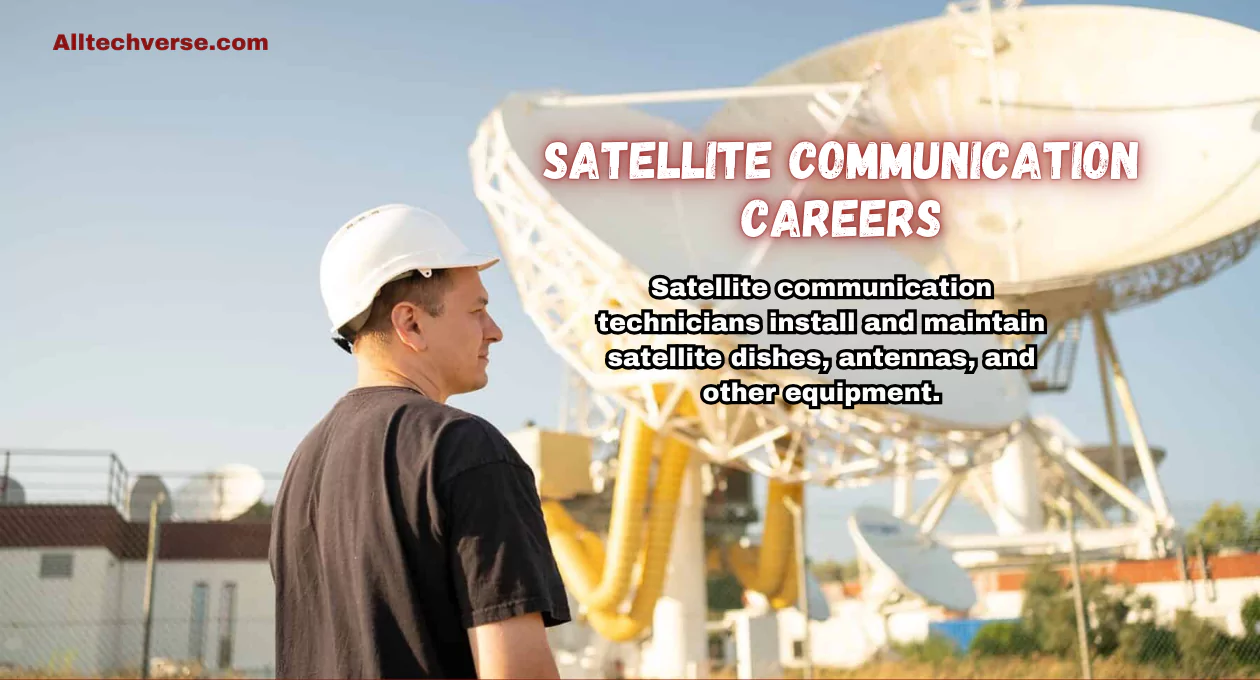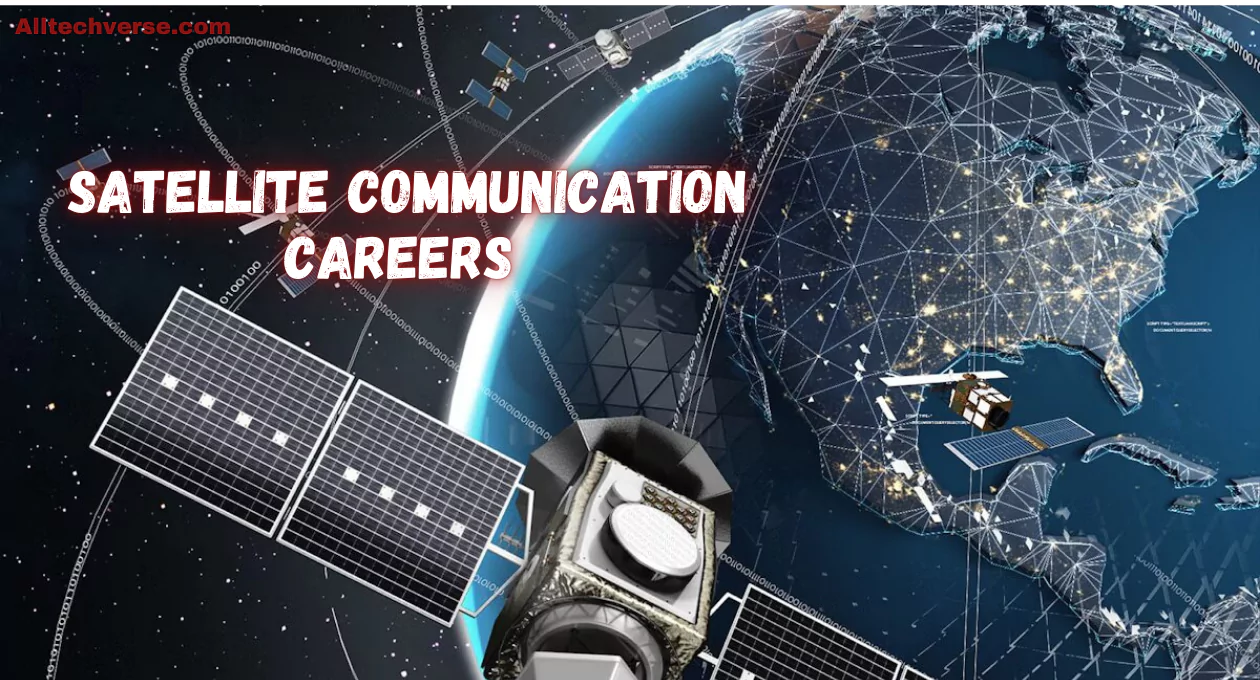Satellite communication plays a crucial role in modern telecommunication networks, enabling everything from TV broadcasts to global internet services. With growing reliance on satellites for communication, defense, and disaster management, there’s a significant demand for professionals in the satellite communication field.
This blog provides an in-depth look at various satellite communication careers, the skills and education required, and the exciting job roles available in this dynamic industry.
The satellite communication industry offers a diverse range of career opportunities that cater to different skill sets and interests. Engineers skilled in satellite design and maintenance are in high demand, while experts in data analysis and network management play a crucial role in optimizing satellite operations. Professionals focusing on regulatory compliance ensure that companies adhere to international laws and standards, facilitating global communication. Additionally, business development and sales roles are vital for driving company growth and expanding market reach in this ever-evolving field.
Careers in Satellite Communication
Satellite communication careers span multiple industries, including telecommunications, broadcasting, defense, and space exploration. Professionals in this field ensure seamless communication between satellite networks and ground stations, contributing to global connectivity.
As the satellite communication industry continues to evolve, the demand for skilled professionals is growing rapidly. New technologies like small satellites and advancements in space travel are expanding opportunities, leading to more innovative roles and responsibilities. Graduates with a background in engineering, computer science, or telecommunications are well-positioned to enter this field, contributing to the development and enhancement of satellite networks. With the right skills and dedication, individuals can find rewarding and challenging careers that push the boundaries of space and communication technology.
Satellite Communication Engineer Jobs
Satellite communication engineers are responsible for designing, developing, and maintaining satellite systems. They ensure that satellite networks provide reliable signals for television, internet, and mobile services. These engineers often work with ground-based equipment and software to monitor satellite operations.
Satellite communication engineers must possess a strong foundation in electrical engineering and telecommunications, along with specialized knowledge in satellite systems. They work collaboratively with other engineers to solve complex technical issues, ensuring optimal performance of satellite systems. As technology advances, these engineers continually update their skills and adapt to new innovations, playing a critical role in advancing the capabilities of satellite communication networks. Their expertise not only maintains current systems but also drives forward-thinking solutions for future satellite technologies.
Skills Needed for Satellite Communication Careers
Key skills include:
- Proficiency in RF (Radio Frequency) technology and signal processing
- Knowledge of satellite networks and protocols
- Programming and system analysis skills
- Problem-solving abilities for troubleshooting technical issues
- Communication skills to collaborate with teams across different departments
Satellite Communication Technician Roles
Satellite communication technicians install and maintain satellite dishes, antennas, and other equipment. They also troubleshoot connectivity issues, align satellite dishes, and ensure proper signal reception. Technicians work in both residential and industrial environments.

As satellite technology becomes more sophisticated, the role of data analysts becomes increasingly vital. These professionals analyze vast amounts of data generated by satellite systems to enhance operational efficiency and prevent potential disruptions. Data analysts in satellite communication must possess strong analytical skills and be proficient with data analysis tools and software. They work closely with engineers and project managers to interpret data patterns, providing insights that drive informed decision-making and improve satellite network performance.
Entry-Level Satellite Communication Jobs
Entry-level jobs in satellite communication include roles such as:
- Junior RF Engineer
- Satellite Operations Technician
- Network Support Specialist
These positions allow newcomers to gain hands-on experience while learning about satellite networks and communication protocols.
Satellite Communication Career Opportunities
The satellite communication field offers career paths in:
- Telecommunications companies
- Space research organizations
- Broadcasting networks
- Government agencies and military operations
Each sector provides unique opportunities for growth and specialization.
Satellite Communication Jobs with Government
Government agencies such as NASA, ISRO, and defense organizations hire satellite communication experts for space missions, military communication, and disaster response. These jobs often involve managing secure satellite links and developing new communication technologies.
The satellite communication industry is poised for significant growth as emerging technologies such as machine learning and artificial intelligence integrate into satellite operations. By automating routine processes and providing real-time data analysis, these technologies enhance the efficiency and precision of satellite networks. The ongoing development of these innovations offers exciting opportunities for professionals to engage in cutting-edge projects. This blend of technology and communication ensures that the industry remains dynamic and continually evolving, inviting new talent to explore and contribute to its expansion.
Satellite Communication Industry Careers
In the commercial sector, companies like SpaceX, Iridium Communications, and SES offer diverse roles. Professionals in these companies work on satellite launches, satellite internet services, and next-generation communication systems.
With the growing reliance on satellite-based technology, innovation in the field is crucial for meeting global communication needs. Engineers and technicians collaborate to develop robust systems capable of handling increasing data demands. As the industry embraces concepts like low-Earth orbit satellites and enhanced ground infrastructure, professionals must stay informed of technological changes to maintain competitiveness. Continuous learning and adaptability ensure they can contribute effectively to advancements that shape the future of satellite communication.
Satellite Communication Systems Analyst
Systems analysts monitor and optimize satellite communication systems, ensuring efficient data flow between satellites and ground stations. They analyze network performance, diagnose problems, and recommend improvements for better communication services.
Data security is a paramount concern within the satellite communication industry, as the integrity and confidentiality of transmitted data must be protected. Satellite networks are often used for sensitive and mission-critical operations, necessitating robust encryption methods and cybersecurity measures. Regular audits and system updates are essential to guard against emerging cyber threats and vulnerabilities. As technology progresses, continued innovation in security protocols will ensure the resilience and trustworthiness of satellite communication systems.
Satellite Communication Career Growth
Career growth in this industry is promising, with opportunities to advance into senior roles like Network Architect, Project Manager, or Director of Satellite Operations. As satellite technologies evolve, professionals with advanced skills and certifications are in high demand.
The satellite communication field is constantly evolving, making professional development imperative. As new technologies emerge, ongoing education and training programs enable individuals to stay abreast of industry innovations. Certifications and specialized workshops provide opportunities to enhance technical skills, ensuring professionals remain competitive in this dynamic landscape. Embracing lifelong learning allows satellite communication experts to contribute effectively to the sector’s growth and the deployment of cutting-edge communication solutions.
Salary in Satellite Communication Careers
Salaries vary depending on role and experience.
- Entry-level positions: $50,000 – $70,000 per year
- Mid-level engineers and analysts: $80,000 – $120,000 per year
- Senior roles and managers: $150,000+ per year
Salaries can also be higher in defense or space research organizations due to the specialized nature of the work.
Satellite Communication Job Market
The satellite communication job market is expanding due to the increasing demand for global connectivity, satellite internet, and advanced telecommunication services. The rise of low Earth orbit (LEO) satellite constellations, like Starlink, is further driving the need for skilled professionals.
With technological advancements accelerating rapidly, the satellite communication field offers intriguing possibilities for innovation. The increasing reliance on satellite connectivity for various applications like remote sensing, global positioning, and broadband services presents numerous challenges and opportunities. Professionals must navigate evolving technical landscapes while addressing environmental and regulatory concerns. This dynamic environment fosters a culture of collaboration and creativity, pushing the boundaries of what’s possible in modern communication.
Education for Satellite Communication Careers
A bachelor’s degree in electrical engineering, telecommunications, or computer science is often required for most satellite communication roles. Specialized certifications in RF engineering and network management can boost job prospects.
Aspiring professionals interested in satellite communication careers can benefit from engaging in hands-on projects or internships that provide practical experience. These opportunities allow individuals to apply theoretical knowledge in real-world settings, enhancing their understanding of satellite systems and network operations. By collaborating with industry experts, participants gain insights into current challenges and emerging trends, preparing them for successful careers in this dynamic field. Additionally, such experiences foster critical problem-solving skills and innovation, essential for thriving in an environment that continually pushes the boundaries of technology.
Satellite Communication Network Engineer
Network engineers in satellite communication manage the infrastructure that connects satellites to ground stations. They design network architectures, ensure optimal signal strength, and monitor satellite internet services to provide reliable connectivity.
The development of satellite technology not only facilitates worldwide communication but also significantly impacts various industries. Innovations in this field lead to improved disaster management, enable real-time navigation systems, and enhance global broadcasting services. As satellite applications broaden, interdisciplinary collaboration becomes essential, driving advancements that benefit societies around the world. This convergence of technologies propels the industry forward, opening new frontiers for exploration and connectivity.
Satellite Communication Internships
Internships offer students practical exposure to satellite communication systems. Companies and government agencies offer internships that allow participants to work on real-world projects, gain technical skills, and network with industry professionals.
Engaging in a satellite communication internship can provide invaluable insights into the workings of cutting-edge technology. Participants are often tasked with assisting in the maintenance and optimization of network systems, contributing to projects aimed at improving communication efficiency. By collaborating with experienced engineers and project managers, interns develop crucial problem-solving skills and enhance their technical knowledge. These experiences not only prepare them for future roles in the industry but also offer a glimpse into the innovative solutions that drive global connectivity.
Frequently Asked Questions About Satellite Communication
What is satellite communication?
Satellite communication is the use of satellites to transmit data, voice, and video signals between different locations on Earth. This method enables global connectivity, supporting a range of applications from television broadcasting to internet services.
How do satellites communicate with ground stations?
Satellites communicate with ground stations through radio waves. They receive signals from ground stations, amplify them, and transmit the signals back to Earth. Ground stations connected to the end users manage this communication process.
What are the different types of satellites used in communication?
The main types of satellites used in communication include geostationary satellites, medium Earth orbit satellites, and low Earth orbit satellites. Each type varies in orbit altitude and serves different communication needs.
Why is satellite communication important?
Satellite communication is important because it provides connectivity to remote and underserved areas, ensures reliable global broadcasting, and supports critical applications such as navigation, weather forecasting, and disaster management.
What are the career options in satellite communication?
Career options in satellite communication include roles such as satellite network engineer, RF engineer, satellite systems analyst, project manager, and network architect, among others.
How can I start a career in satellite communication?
To start a career in satellite communication, pursue a degree in electrical engineering, telecommunications, or computer science. Gain experience through internships, engage in hands-on projects, and consider obtaining specialized certifications related to satellite systems and network management.
Conclusion
The satellite communication industry offers exciting career prospects across various domains, from engineering and network management to government roles and space exploration. With growing investments in satellite internet and LEO constellations, the demand for skilled professionals will continue to rise.
Whether you’re interested in becoming a systems analyst, RF engineer, or technician, satellite communication careers offer long-term growth and opportunities to work on cutting-edge technologies. For those looking to enter this field, gaining hands-on experience through internships and building relevant skills will open doors to rewarding job roles.
For more amazing information keep visiting Alltechverse



